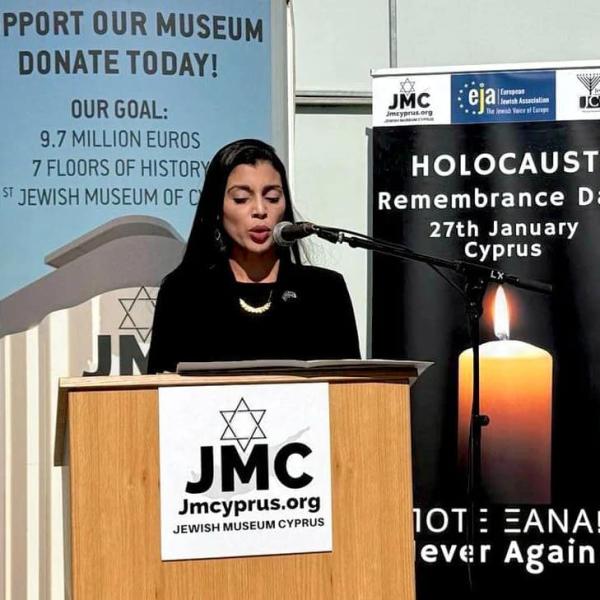Organized by the Jewish Museum of Cyprus

Speech by the Deputy Head of Mission Rotem Segev, at the Holocaust Commemoration Event organized by the Jewish Museum of Cyprus:
"On this #InternationalHolocaustRemembranceDay, we remember and honor the victims of the horrific genocide that took place during World War II.
We come together not only to remember the unimaginable atrocities of the past, but also to honor the resilience of the human spirit and reaffirm our commitment to ensuring such horrors are never repeated.
As we reflect upon the darkest chapter in human history, and pray for the victims, we must retell the painful reality of the Holocaust. Six million innocent lives were lost, entire families were torn apart, communities were decimated. The magnitude of suffering and the sheer cruelty that unfolded during those years, demand our unwavering attention and remembrance.
The tragedy of the Jewish people, my people, that only recently reached the same population size it had before the Holocaust, is fundamental in understanding Israeli people today. The horrific events of the Holocaust are engraved in our collective mind. It is part of our personal and national identity. It marks our perspectives and values.
In remembering the Holocaust, we must also acknowledge the heroes, who risked their lives to resist the forces of hatred and tyranny. Their stories serve as beacons of hope, reminding us that even in the face of unspeakable evil, kindness and bravery exists.
Such story, a story of heroism and bravery, is that of the Warsaw Ghetto Uprising.
The rebellion broke out 81 years ago, on the eve of Passover, on April 19, 1943. It was the first urban rebellion against the Nazis, and the longest and the biggest Jewish uprising during the Holocaust.
The uprising was a desperate act against the Nazis by the Jewish prisoners of the ghetto, an attempt to prevent their transportation to Treblinka extermination camp. They preferred to die while trying to fight, rather than accept this fate.
Despite the meager means at their disposal, the rebels managed to fight and even cause some losses to the Nazi forces, who were sent to suppress the rebellion.
After a few days of fighting, the Nazis began to systematically blow up and burn the building of the ghetto, in order to confront the fighters and force them out of their hiding places.
Due to the Warsaw ghetto uprising, the liquidation of the ghetto took almost four weeks. For a month, the Jews of the Warsaw ghetto fought for their lives.
The news about the rebellion spread out quickly, and was even covered by the media of the ‘free world’. The uprising became a symbol of the battle of the few against the many, and of the freedom and the power of the human spirit.
One of the resistance fighters was Rachel Zylberberg, who was known as Sarenka. She was born on January 5th, 1920 in Warsaw, Poland.
Sarenka escaped to Eastern Poland, together with her sister Ruth, just as the Second World War broke out and the Germans invaded Poland, in September 1939. They then moved to Vilnius, where Sarenka joined a Zionist secular Jewish youth movement, ‘Hashomer Hatzair’. There she met her partner, Moshe Kopito.
They lived together in Vilnius and had a baby, who was born on February 22nd, 1941. They named her Maya. A few months later, Moshe was murdered by the Nazis while attempting to buy milk and supplies for their daughter.
‘Hashomer Hatzair’ movement decided to send Sarenka back to the Warsaw Ghetto in January 1942 as a partisan. Sarenka had to leave behind her baby girl Maya at an orphanage in Vilnius, under a fake name.
She was actively involved in the Warsaw Ghetto uprising, led by Mordechai Anielewicz in April 1943.
She was killed on May 8th alongside 50 other Jewish fighters, in the bunker known as ’Mila 18’, having her weapon next to her. Maya’s traces were not found since.
Sarenka’s story is just one, of many others, who lived, who loved, who fought and who paid the ultimate price.
Today, it is our collective responsibility to ensure that the lessons of the Holocaust are learned, that the stories are told, from one generation to the other. Education has a key role in fighting against prejudice, discrimination and ignorance. By learning about the past, we create a future where tolerance and acceptance prevail.
As the Deputy Ambassador of the State of Israel, please allow me to add a few more words in regards to the recent rise in the voices against Israel and the Jewish people.
One of the most significant ways in which the Holocaust influenced Israel, is in its creation as a safe haven for Jews. The horrific genocide committed by the Nazis and their collaborators, demonstrated the urgent need for a homeland, where Jews could live in safety and security.
Since the October 7 massacre, Jews around the world had been experiencing high levels of antisemitism, more than even before. These unbearable hate level exists in different countries around the world, and not only threatened the Jews and their safety, but also challenge every society who considers itself human.
I’m hopeful that in the world I’m leaving to my daughters, antisemitism will not be a part of it.
Remembering and never forgetting helps to ensure that the memory of the Holocaust is passed down from generation to generation, and serves as a constant reminder of the need to stand up against hatred and intolerance.
Especially today, it is our duty, and it is in our power, to make sure that the Never Again message, is being actively implemented, in the light of the past events, but more importantly, in the light of the current events.
Today, we are honored to have among us the Holocaust survivor Rivka Kahana, who came all the way from Israel, to tell us her story.
Thank you, Rivka and the whole family, for coming. Thank you all.
